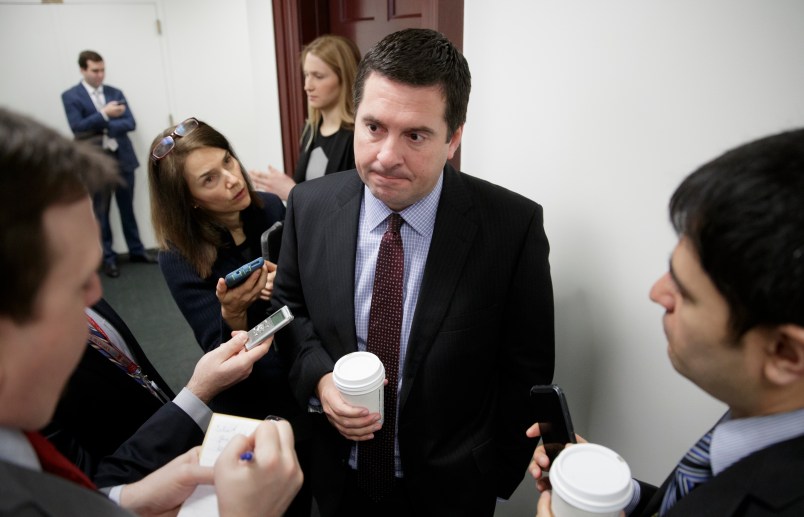The co-founder of the firm that produced the so-called Trump dossier told the House Intel Committee that early on in his investigation he saw “patterns of activity” from the Trump Organization that “might be suggestive of money laundering,” including dealings with Russian ties.
The allegation was one of many Fusion GPS co-founder Glenn Simpson discussed in an interview with the House Committee in November. The transcript was posted online Thursday after a bipartisan committee vote to release it.
The committee’s top Democrat, Rep. Adam Schiff (D-CA) bashed his Republican counterparts in a statement Thursday that said they have “refused to look into” the “key area” of whether the Trump Organization had engaged in money laundering with Russians.
“[W]e hope the release of this transcript will reinforce the importance of these critical questions to our investigation,” Schiff said in the statement.
The interview took place on November 14, a little less than three months after Simpson spoke with the Senate Judiciary staff — the transcript of which was released by Senate Judiciary Ranking Member Dianne Feinstein (D-CA) last week.
His interview with the House Intelligence Committee covers much of the same ground. However Simpson goes into a little bit more detail about what areas of President Trump’s past he was researching for each of the two clients that had hired him for the project: first the conservative Washington Free Beacon, and the later Clinton campaign and the Democratic National Committee. (The identity of both clients became public in October, between the two interviews.)
According to Simpson, Fusion GPS’ interest in Trump’s Russia ties was first piqued while the project was being financed by the Washington Free Beacon.
“One of the very first things that I focused on was Donald Trump’s relationship with a convicted racketeer named Felix Sater, and who was alleged to have an organized crime, Russian organized crime background,” Simpson said, leading to his research into a business deal that Trump was involved in known as the Bayrock deal.
Trump’s trip to Moscow for the 2013 Miss Universe pageant, and a vodka deal he pushed there also jumped out to Simpson in the spring of 2016, he told the committee.
He said some of Trump’s dealings exhibited “the patterns of activity that we thought might be suggestive of money laundering.” He pointed to Trump’s golf course projects in Scotland and Ireland, as well as his relationship with Alimzhan Tokhtakhunov, who sat in the VIP box at the Miss Universe pageant in Moscow.
“He was running a high-stakes gambling ring out of Trump Tower, while he himself was a fugitive for having rigged the skating competition at the Salt Lake Olympics and a bunch of other sporting events engaged in rigging,” Simpson said of Tokhtakhunov.
Simpson also said Fusion GPS did some research into Trump son-in-law Jared Kushner, but admits that Kushner is “someone who I sort of misjudged.”
“I didn’t think he was going to be very interesting and very important, partly because he was so young. But in any event, we did look at some Kushner stuff and specifically focused on the project in Jersey City, I think partly because Trump had a position in that project,” Simpson said.
On repeated occasions, the committee’s Democrats asked Simpson who else House Intel should be investigating, and what institutions the committee should subpoena (particularly as Simpson noted his firm did not have the power to compel production of information).
“So the first thing that I would do would be to subpoena the brokers and the people, the other people that were involved in the transactions, and the title companies and the.other intermediaries that would have that kind of information,” Simpson said, when asked specifically about how the committee should go about the investigating the money laundering allegations. “Then I would go to the banks next. But I actually think some of the intermediary entities in a lot of these transactions are going to be where a lot of the information is.”
Simpson in his November interview got into some of the nuts and bolts about his relationship with Christopher Steele, the ex-British spy hired by Fusion GPS to investigate Trump’s Russia ties, and how Simpson views Steele’s work for the firm.
He said he was not aware of Steele paying any of his sources, while defending his methods of gathering information.
He also discussed Steele’s decision to go to the FBI with what he had uncovered, an idea Steele initially “raised” Simpson but one Simpson didn’t give his approval of, before Steele’s first contact with the FBI in July 2016, according to Simpson’s account.
“We did not ask permission from the client to do that. The client didn’t instruct us to do that. It was — he was — you know, it was viewed as reporting a crime in progress, sort of a citizenship obligation,” Simpson said.
Read the transcript below:







So isn’t this just the document that
Nancy PelosiDiane Feinstein already released?EDIT: Corrected name of person doing the releasing, thanks to @southerndem for catching the error…
Dianne Feinstein released the senate testimony
Oh no, not another reading assignment!
Teh documents! Teh documents! They’re killing me!
Saw this response on Free Republic
Hannity reports he hears the FBI/DOJ dox just released to the House - which not a SINGLE DEM voted to release - are “devastating” & should result in the “immediate firing” of McCabe, Ohr, Strzok, ROSENSTEIN aaaaaaand MUELLER. He named them ALL.
They wish of course
DiFi has set something in motion. Good.